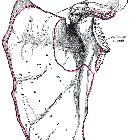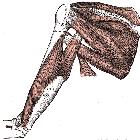Infraspinatus muscles



The Infraspinatus muscle is one of the four muscles that make up the rotator cuff, the others being: supraspinatus, teres minor and subscapularis.
- origin: infraspinatus fossa of the scapula
- insertion: middle facet of the greater tubercle of the humerus
- innervation: suprascapular nerve (C5-6)
- arterial supply: suprascapular and circumflex scapular arteries
- action: external rotation of the humerus
Gross anatomy
Origin
It arises medially from the infraspinous fossa of the scapula, specifically from fleshy fibers from its medial two-thirds, and by tendinous fibers from the ridges on its surface; it also arises from the infraspinatous fascia which covers it, and separates it from the teres major and minor muscles.
Insertion
The fibers converge to a tendon, which glides over the lateral border of the spine of the scapula, and, passing across the posterior part of the capsule of the shoulder joint, is inserted into the middle facet of the greater tubercle of the humerus.
Relations
The tendon of this muscle is sometimes separated from the capsule of the shoulder joint by a bursa, which may communicate with the joint cavity.
Innervation
The infraspinatus muscle is supplied by the suprascapular nerve (C5 and C6), which arises from the superior trunk of the brachial plexus and passes laterally through the posterior triangle of the neck and through the scapular notch on the superior border of the scapula. After supplying fibers to the supraspinatus muscle, it supplies articular branches to the capsule of the shoulder joint.
Action
It acts with teres minor to externally rotate the glenohumeral joint, and with other rotator cuff muscles to stabilize the shoulder.
Siehe auch:
und weiter:

 Assoziationen und Differentialdiagnosen zu Musculus infraspinatus:
Assoziationen und Differentialdiagnosen zu Musculus infraspinatus:



